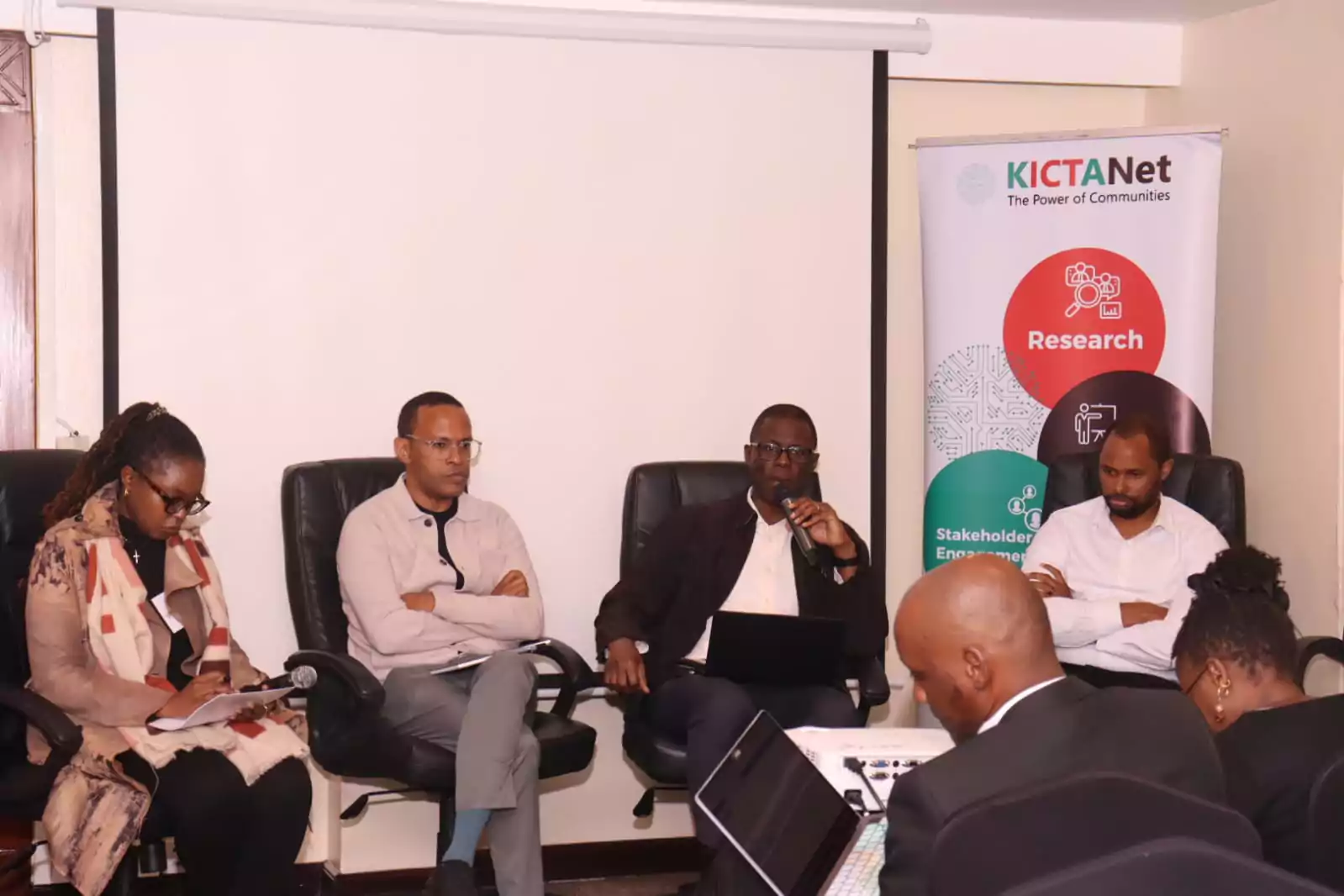On November 16, 2023, KICTANet hosted a policy discussion on artificial intelligence (AI) in Kenya, bringing together various stakeholders from the government, private sector, civil society, and academia.
The Thought Leadership Series aimed to explore the benefits and challenges of AI in the country and identify priority areas and solutions to promote a conducive environment for its development and use.
The discussion featured two panel sessions on AI applications and Kenya’s AI priorities, as well as opening remarks from the Ministry of Information, Communications, and the Digital Economy.
The participants shared their insights and recommendations on how to harness the potential of AI for Kenya’s social and economic development while addressing ethical and legal issues and ensuring the respect and protection of human rights.
Key highlights and outcomes of the round table
Eng. John Kipchumba Tanui, MBS – PS, State Department for Information Communications Technology (ICT) and Digital Economy, whose remarks were read by Mr. Nusu Mwamanzi, Director of ICT Research, Policy, & Innovation He highlighted the following points:
- The ministry is undergoing an ICT sector reform process and has appointed an ICT sector task force to evaluate and review the policies, frameworks, structures, and protocols of the ICT and digital economy sectors in Kenya.
- AI has the potential to transform and enhance many economic sectors in Kenya, such as health, education, and finance, by providing new ways of analyzing, disseminating, and generating information, improving decision-making, developing new products and services, and making them more efficient and accessible.
- However, there are also significant challenges and risks associated with AI, such as lack of awareness, skills, data, and infrastructure, ethical and legal issues, and social and economic impacts.
- Kenya does not have a stand-alone AI policy, strategy, or regulatory framework. It relies on several existing laws to address issues related to AI and digital technologies, such as the Data Protection Act of 2019, which confers a framework for data protection in Kenya.
- There is room to work with all relevant stakeholders, KICTANet included, to develop and finalize the AI policy for Kenya. Together, we can develop policy, legal, and regulatory frameworks that can address the potential harm, concerns, and opportunities arising from AI use and development in Kenya.
The first-panel session, “Presentation on AI Applications,” chaired by Ali Hussein Kassim, discussed the opportunities and challenges of using artificial intelligence (AI) in Kenya, with a focus on the role of open source, data, and human rights.
The panellists were: Representative Meta, Leonida Mutuku, LDRI/Local Co., Joel Onditi, Pathways Technologies Limited; and Selemani Kinyunyu, Microsoft. Some of the key points raised were:
- Open source is not necessarily free, and there are trade-offs between data, cost, and quality. There is a need for more collaboration and transparency between big tech companies and local developers and users of AI.
- AI can positively impact various sectors in Kenya, such as health, education, finance, and security. However, there are also potential risks and challenges, such as inadequate awareness, skills, infrastructure, and regulation.
- AI should be developed and deployed with a human rights-based approach rather than a risk-based approach. This means ensuring that AI respects and protects the rights and dignity of the people and that there is accountability and participation in the design and implementation of AI.
The second panel session, “Kenya’s AI Priorities,” moderated by John Walubengo, CISA, CDPSE, (OGW) of the Kenyan ICT Review Task Force, had insights shared by Florence Ogonji, CIPIT, Mr Kamau Maina, Safaricom PLC, and Jack Ngare, Technical Director Office of the CTO Google. Some of the key points raised were:
- AI is dominated by a few global players who have the resources, expertise, and data to build powerful models. This poses a challenge for local innovation and competition, as well as ethical and social implications.
- There is a need for more participation and inclusion of diverse stakeholders, especially marginalized and vulnerable groups, in the AI ecosystem. This can help to ensure that AI is responsive to local needs, values, and contexts and that it does not exacerbate existing inequalities and injustices.
- There is a need for more investment and support for AI education, research, and development in Kenya. This can help to build local capacity and talent, foster innovation and entrepreneurship, and create more opportunities and benefits for the people.
Views from the meeting will be used to produce a policy brief that summarizes the main policy issues and recommendations for different stakeholders to follow.
![]()




